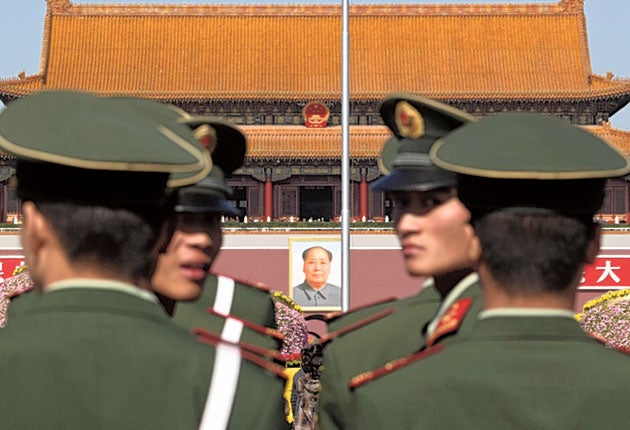Nobel row clouds China's five-year plan for growth

The annual meeting of China's leaders began behind closed doors yesterday, with discussions on the economy overshadowed by the threat posed to the Communist Party by the award of the Nobel peace prize to a prominent dissident.
The Communist Party gathering aims to find ways of persuading China's growing middle-class to spend more money. It will also seek to tackle the political fallout from the widening gap between rich and poor. Although the meeting is supposed to be a secret, it is well known that it is being held at a government hotel in west Beijing; it is expected that the details will be revealed only when discussions have finished.
Despite the secretive nature of the talks, the official Xinhua news agency has already reported that the leadership will discuss "proposals for the nation's next five-year development plan" from 2011 to 2015. The country's economic welfare is a growing concern for the party, which relies on stability to maintain the iron grip on power it has held for more than six decades. But the award to jailed activist Liu Xiaobo and growing demands for political reform have rattled a leadership trying to organise an orderly handover to the next generation of leaders in 2012.
Premier Wen Jiabao made a series of high-profile but opaque calls for reform in the run-up to the four-day meeting by the 300-strong Central Committee. In an interview with CNN, Premier Wen said: "The people's wishes for and needs for democracy and freedom are irresistible. I hope that you will be able to gradually see the continuous progress of China."
His comments are not too distant from what Mr Liu wrote in a pro-democracy document in 2008, which led to him being jailed for 11 years for subversion. However, Mr Wen provided few details and was not arguing for Western-style democracy, but seeking ways to ensure the 78-million-strong Communist Party stays in power.
A group of 100 activists, lawyers and academics in China have signed a petition calling for Mr Liu's release. They have also picked up on Mr Wen's reformist message including his speech in the southern boomtown of Shenzhen, where the former supreme leader Deng Xiaoping began the reforms that have led China to its current levels of strength.
"In a recent series of speeches, Premier Wen Jiabao has intimated a strong desire to promote political reform. We are ready to engage actively in such an effort," the petition said.
It came just days after a letter signed by 23 Communist Party elders circulated calling for an end to restrictions on the freedom of speech.
The meeting will be closely watched for evidence of whether current favourites Xi Jinping and Li Keqiang are in a position to replace President Hu Jintao and Premier Wen, respectively, in 2012.
Among other possible contenders for leadership posts is Bo Xilai, former trade minister and rising star in the western city of Chongqing, where he has cracked down on corruption. His son studied at Oxford and many see Bo Xilai as embodying a new kind of Chinese leadership.
The focus for the Chinese public remains the economy, which continues to grow strongly but not at the double-digit rates seen before the slowdown. The government believes 8 per cent growth is necessary to preserve stability. And while China has lifted hundreds of millions out of poverty, many millions in the countryside live on less than a dollar a day.
"As the owner of a private company, I hope the five-year plan does more to lead the economy into the market with a real sense of economic reform," said Lin Ying, a 44-year-old entrepreneur.
Mr Lin said that since the onset of the global economic crisis the state sector had shown signs of supplanting the private sector in some areas, and he hoped these would be reversed.
Liu Shanying, a political science researcher at the Chinese Academy of Social Sciences, told the China Daily: "Due to the uneven distribution of income, the fruits of economic growth are not equally shared by the people, which has resulted in growing social conflict and instability."
Zuo Xiaolei, chief economist of China GalaxySecurities, said: "Inclusive growth will help China to deal with a lot of the problems [that are now appearing], and this is very important to the future of China."
Tipped for the top
Xi Jinping
One of the 'princelings' – the communist equivalent of bluebloods – he is believed to be in line to assume the top position of president and party boss. To ensure that happens smoothly at the current party meeting, he needs to be appointed deputy head of the People's Liberation Army. Married to a famous singer, Mr Xi is the son of a veteran revolutionary and guerrilla leader. He earned his stripes when he dealt with a smuggling scandal in the southern Fujian province and presided over strong growth in the eastern province of Zhejiang. He also won kudos for his performance in making sure the Olympics were a success.
Li Keqiang
Came from a position as party head of the rust-belt factory province of Liaoning. He is a protégé of President Hu and hails from the immensely influential Communist Youth League, Mr Hu's main power base. He studied law at the elite Beijing University after the Cultural Revolution. He became party leader in Henan in 1998, where he earned praise for dealing with the Aids crisis created by tainted blood transfusions. In 2004 he moved to Liaoning where he lured firms like Intel and BMW to replace crumbling state-owned industries.
Subscribe to Independent Premium to bookmark this article
Want to bookmark your favourite articles and stories to read or reference later? Start your Independent Premium subscription today.

Join our commenting forum
Join thought-provoking conversations, follow other Independent readers and see their replies